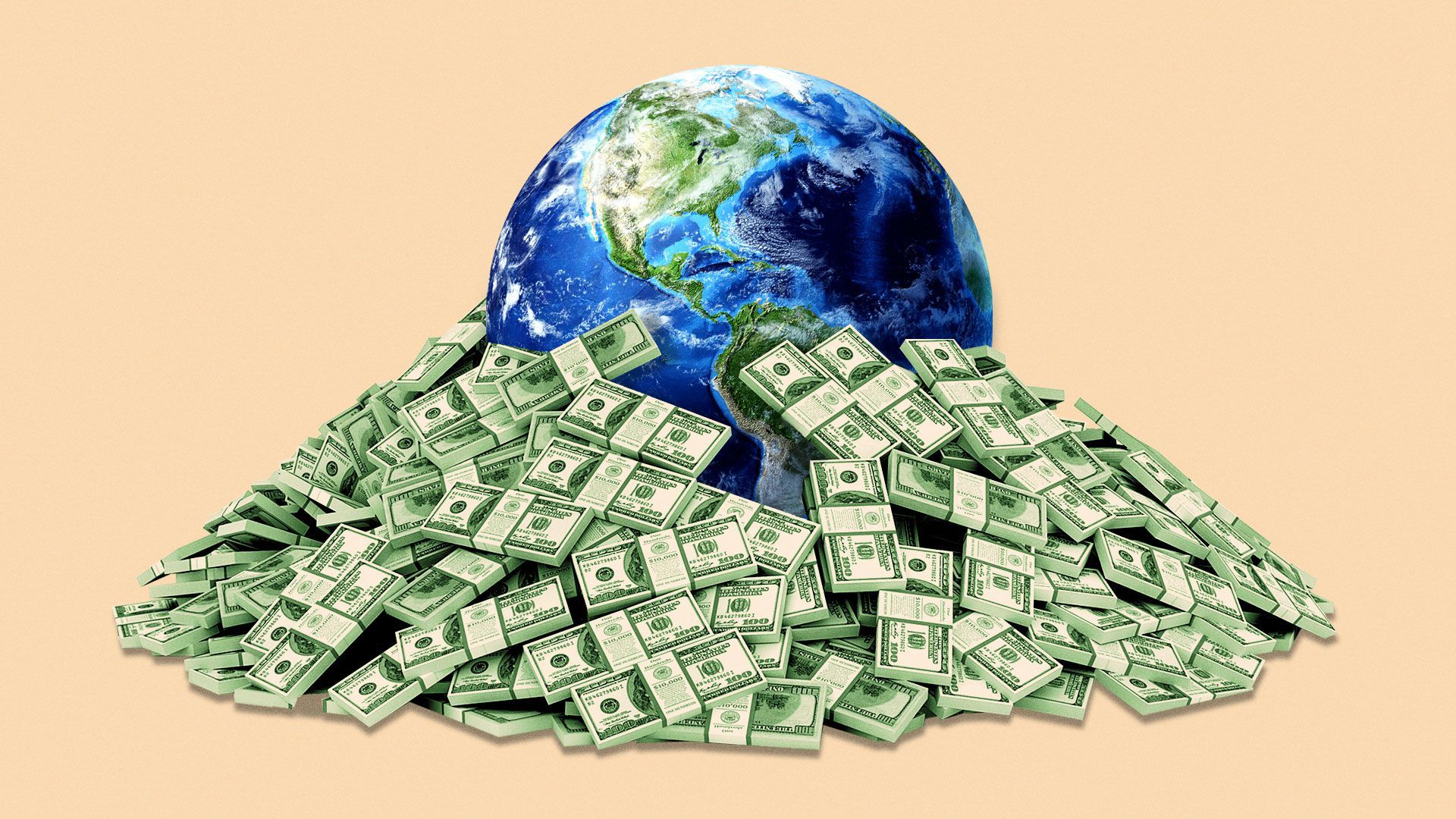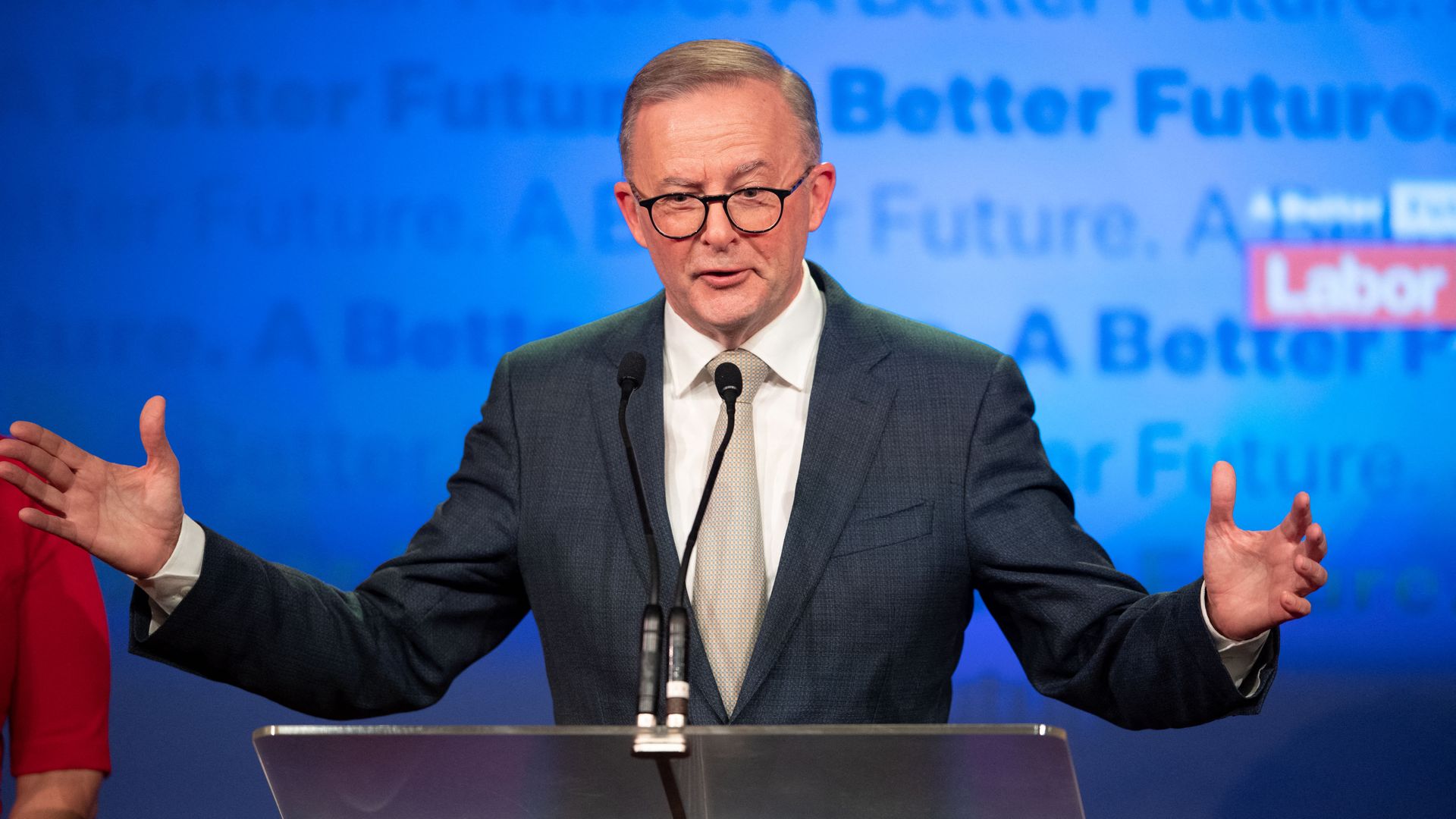| |
| |
| |
| Presented By JPMorgan Chase |
| |
| Axios Generate |
| By Ben Geman and Andrew Freedman · May 23, 2022 |
| 👋 Welcome back! Today's Smart Brevity count is 1,196 words, 4.5 minutes. 📬 Did a friend send you this newsletter? Welcome, please sign up. 🎶 At this moment in 2001, Destiny's Child ruled the Billboard album charts with "Survivor," which provides today's epic intro tune... |
| |
| |
| 1 big thing: The U.S. is playing catch-up on EVs |
 Data: IEA's Global EV Outlook 2022; Chart: Jared Whalen/Axios President Biden took a victory lap in South Korea over Hyundai's big U.S. new electric vehicle investments, but fresh analysis shows how far the U.S. lags behind in the global EV supply chain competition, Ben writes. Driving the news: "Electric vehicles are good for our climate goals, but they're also good for jobs, and they're good for business," Biden said in Seoul yesterday alongside Hyundai chairman Euisun Chung. Biden's remarks came two days after Hyundai unveiled $5.4 billion plans to build EVs and batteries in Georgia. The big picture: The South Korean auto giant is the latest of many automakers and battery producers to unveil U.S. investments recently. - General Motors in January announced a multibillion-dollar plan to build battery cells and electric pickups in Michigan, one of several states where it's boosting capacity.
- Ford, SK Innovation, Rivian, Stellantis, Toyota and others are developing large battery and EV manufacturing projects.
Yes, but: An International Energy Agency report this morning starkly captures something Axios' Joann Muller recently explored: The U.S. is playing catch-up behind China and Europe. The chart above offers key parts of a more granular IEA analysis of the global supply chain — spanning raw materials, processing, manufacturing and more — for batteries and EVs. What we're watching: How that chart will look in 5, 10 and 15 years — and how U.S. policy affects it. - The Energy Department is offering new funding via the bipartisan infrastructure law to boost U.S. battery and component manufacturing and recycling.
- The administration has also set aggressive EV deployment targets, but a key policy goal — a huge expansion of buyer subsidies — has stalled in Congress.
The bottom line: Cars with plugs and the batteries that run them are becoming a major 21st-century industry — and a tool against global warming. But which nations will benefit the most is up for grabs. |
    |
| |
| |
| Bonus: EV growth and headwinds |
 Data: IEA's Global EV Outlook 2022; Chart: Jared Whalen/Axios Global electric car sales reached 2 million in the first quarter of 2022, up 75% from the same stretch in 2021, the new IEA report shows, Ben writes. Why it matters: EV sales had already doubled in 2021 over the prior year, capturing about 10% of the new vehicle market, the report points out. While they remain a tiny share of the global fleet, 2021 sales boosted the total number of EVs on global roads to 16.5 million at year's end, and that's rising significantly higher this year. Yes, but: Growth still lags what's envisioned in IEA's hypothetical pathway to net-zero global greenhouse gas emissions in 2050. And the commodity cost surge is putting upward pressure on battery prices after years of declines. Read the report. |
    |
| |
| |
| 2. The soaring costs of climate inaction |
 |
|
| Illustration: Eniola Odetunde/Axios |
| |
| Unchecked climate change would be a major impediment to economic growth during the next 50 years, costing an estimated $178 trillion in net present value terms during the 2021-2070 period, a new study concludes, Andrew writes. The big picture: The study from the Deloitte Center for Sustainable Progress models the impacts of a 3°C increase in global average temperatures compared to preindustrial levels, which is consistent with the world's current pathway. - It shows the associated effects on future productivity, economic output and growth across industries and regions.
Zoom in: In contrast to unchecked warming, the report states that if countries act quickly to reach net-zero emissions by 2050 and hold global warming to below 2°C, the global economy would see an expansion of $43 trillion in net present value during the 2021-2070 period. Yes, but: There will be a period of time, potentially lasting a few decades, when the upfront costs of the clean energy transition would outweigh the benefits, the report notes. (A similar tone was struck in a McKinsey report last year.) Context: The stakes may be highest in the Asia-Pacific region, the report finds, because a 3°C scenario would hit GDP the hardest there. This is partly due to the region's vulnerability to extreme weather events. What they're saying: "Insufficient action to mitigate climate change is a policy choice that can be made," said the report authors Pradeep Philip and Claire Ibrahim, via email. "But it is a choice that comes with a high cost." |
    |
| |
| |
| A message from JPMorgan Chase |
| How finance can help fund the future |
| |
 |
| |
| JPMorgan Chase is financing and facilitating $2.5 trillion over 10 years to help advance solutions that address climate change and contribute to sustainable development. Even better: This target includes $1 trillion to support green initiatives. Learn more about the firm's target. |
| |
| |
| 3. Australia set for big climate policy shift |
 |
|
| Newly elected Australian Prime Minister Anthony Albanese on May 21. Photo: Wendell Teodoro/AFP via Getty Images |
| |
| In elections this weekend, Australians voted out the long-ruling conservative coalition in favor of Labor candidate Anthony Albanese, Andrew writes. Why it matters: Following multiple elections that have featured climate change as a flashpoint, this election marks a potential paradigm shift in Australia's policies. - Strong showings for independent and Australian Greens candidates along with polling indicated that climate change played a key role in the election despite it being downplayed by the Albanese campaign and by the incumbent prime minister Scott Morrison.
- The country is one of the world's leading coal and liquified natural gas exporters, and Morrison was seen as an ally of the fossil fuel industry.
Context: Australians have experienced a string of climate change-related disasters in recent years, from unprecedented wildfires and heat waves to record flooding and coral bleaching throughout its iconic Great Barrier Reef. What's next: In his victory speech Saturday, Albanese signaled Australia's days as a climate policy holdout may be over. "Together we can take advantage of the opportunity for Australia to be a renewable energy superpower," he said. - The Greens, which could hold significant sway in the new government, are calling for an end to all new domestic gas and coal projects.
|
    |
| |
| |
| 4. Layoffs at software startup and more biz notes |
 |
|
| Illustration: Aïda Amer/Axios |
| |
| Colossus Energy, a startup that sells enterprise software to solar companies, laid off nearly 100 employees on May 6, Axios' Megan Hernbroth scooped Friday afternoon. Why it matters: Uncertainty abounds in the solar industry. What's happening: Colossus cut 97 roles across sales, support, quality assurance and HR, according to a crowdsourced document helping affected employees search for new opportunities that Axios obtained. The bulk of cuts was across the company's call center representatives, the company confirmed to Axios. Sign up for Axios Pro Climate Deals to read the whole story. Elsewhere in business... - 🛢️"The United Arab Emirates' biggest oil company and Borealis AG are seeking to raise $2 billion from an initial public offering of their chemicals joint venture in Abu Dhabi, set to be the biggest ever listing in the emirate." (Bloomberg)
- 🍃 "Siemens Energy on Saturday launched a 4.05 billion euro ($4.28 billion) bid for minority holdings in struggling wind turbine unit Siemens Gamesa, hoping to remove a complex ownership structure that has weighed on its shares." (Reuters)
|
    |
| |
| |
| 5. Here comes a new international "climate club" |
 |
|
| Illustration: Aïda Amer/Axios |
| |
| G7 finance ministers have tentatively backed Germany's push to create a "climate club," but it's unclear what it might tangibly do, Ben writes. Driving the news: A joint communique Friday vows to explore an "open, cooperative" group to support the Paris agreement, with participation beyond the G7. It would seek a "paradigm shift" by showing that "ambitious climate action is conducive to strong and sustainable growth for all economies." Catch up fast: German Chancellor Olaf Scholz floated the idea as Germany assumed the rotating G7 presidency. - "We will no longer wait for the slowest and least ambitious," he said in a January speech.
- "We will turn climate action from a cost factor into a competitive advantage — by agreeing on joint minimum standards."
What's next: Ministers plan to revisit the topic at October's meeting after discussions within the group and with emerging economies. |
    |
| |
| |
| A message from JPMorgan Chase |
| Funding the future with a $2.5 trillion target |
| |
 |
| |
| In 2021, JPMorgan Chase financed and facilitated $285 billion towards its 10-year sustainable development target. Across the firm's three objectives: - 41% went towards development finance.
- 37% towards green.
- 22% towards community development.
Explore progress in the 2021 ESG report. |
| |
| 🙏Thanks for reading and we'll see you back here tomorrow! |
 | It's called Smart Brevity®. Over 200 orgs use it — in a tool called Axios HQ — to drive productivity with clearer workplace communications. | | |
No comments:
Post a Comment